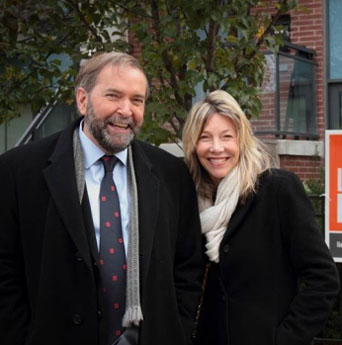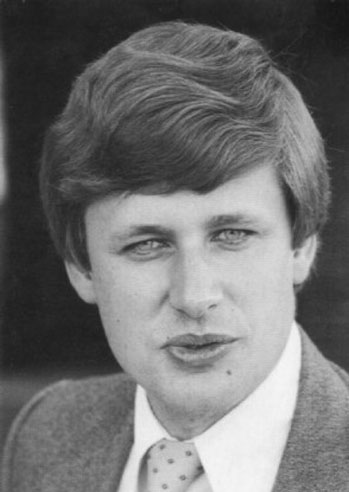Citizen X on Canadian election 2015, I .. starting officially : 8 night thoughts
Aug 11th, 2015 | By Citizen X | Category: In Brief1. ONE WEEK DOWN, TEN TO GO. [Well … with this August 13 polling update, it’s more like 1½ weeks down, 9½ weeks to go!]. The move to fixed election dates itself lengthens the unofficial campaign.
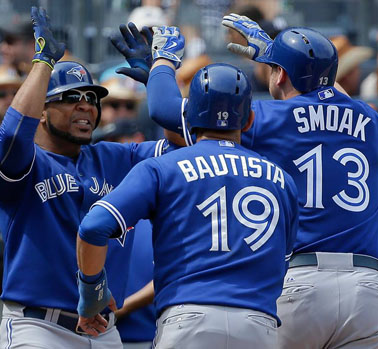
Toronto Blue Jays' Edwin Encarnacion, left, greets Justin Smoak (13) and Jose Bautista (19 – aka Joey Bats) after Smoak hit a grand slam home run against the New York Yankees during the sixth inning in the Bronx, Saturday 8 August 2015. (AP Photo/Julie Jacobson : but remember, counterweights’ own Blue Jays guru Rob Sparrow is watching this too!)
And now in 2015, in yet another of Stephen Harper’s schemes, the official campaign is longer than in any other Canadian federal election since 1872. In the vernacular I’m learning from  my 2-year-old grandson, “Wow!”
This past Sunday the CTV News site asked visitors : “After a week of campaigning, my interest in the election is …?” Almost 6200 Â responded.
A clear if still modest majority (51%) said their interest in the election had been “Unaffected” by the first week of official campaigning. Another 18% said it was “Lower,” followed by 16% who said “Higher.” A final (very hip?) 15% ticked a box marked “What election?”
2. NO MAJORITY FOR ANYONE IN SIGHT ???? [UPDATED AUGUST 12, 13]. Eric Grenier’s CBC Poll Tracker – like all other devices of its sort based on recent polling averages – continues to prophesy various three-party crazy quilts for Canadian federal political leaders to deal with after October 19. Consider, eg, the August 13 update, based on polling averages to August 11.
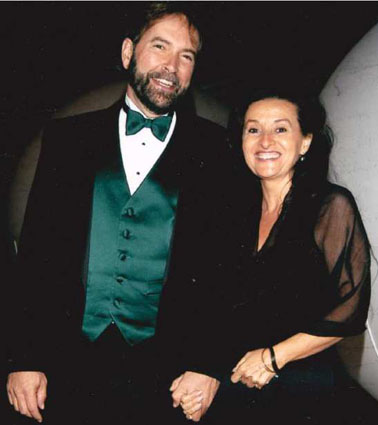
“A younger Tom Mulcair and his wife Catherine, at a gala event (year unknown). Photo courtesy of Tom Mulcair”!!
In a Canadian House of Commons where you need at least 170 seats for even a bare majority government, the August 13/11 Poll Tracker gives the front-running New Democrats 127 seats with 33.5% of the cross-Canada popular vote. The Conservatives have 118 seats with 29.3% of the vote . The Liberals have 91 seats with 27.2%. And the Bloc (5.1%) and the Greens (4%) get one seat each (even with the new/old Bloc Quebecois leader Gilles Duceppe, and Elizabeth May’s excellent debate performance a week ago now!).
Fortunately, there are still almost 10 weeks (well 9½ anyway) in which we the Canadian people can get a grip on ourselves, and finally come in with a result that will be a lot easier for our elected (and other) political leaders to manage. (Or so they think??)
3. HOW ABOUT CALLING AUGUST 6 TV DEBATE A 4-WAY TIE? Personally I thought all four participants in the Maclean’s Leaders Debate on TV last Thursday night did well.
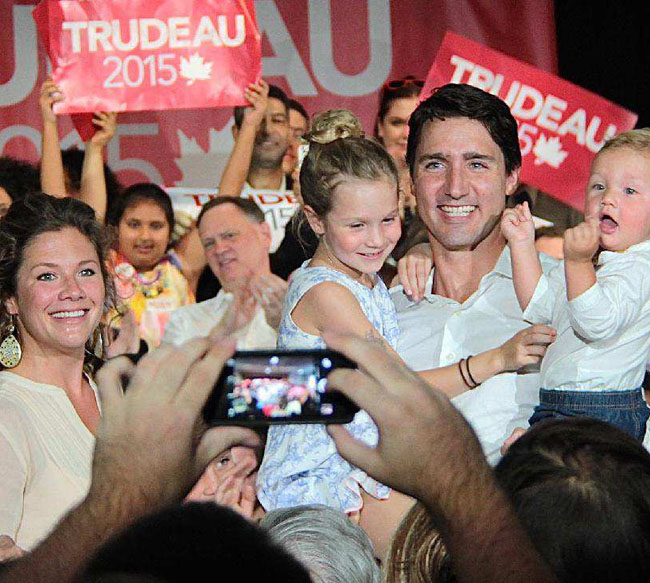
Liberal leader Justin Trudeau, with his wife Sophie Gregoire, far left, holds daughter Ella-Grace and son Hadrien during a campaign stop Sunday in Ottawa West-Nepean riding. ANAIS LYNN VOSKI / OTTAWA CITIZEN.
It would almost certainly be too much to say that all of Harper (Cons), May (Greens), Mulcair (NDP), and Trudeau (Libs) sensed  history was watching and put on their best behaviour. But they at least impressed Josh Barrow at the New York Times.
See Mr. Barrow’s “Debate With Substance. No, Not That Debate … Last night, I watched a really interesting political debate, in which the candidates engaged one another substantively about their vision for the country’s future … Unfortunately for Americans, this was a debate among Canadian political leaders. It aired on C-Span, but you may have missed it.”
4. SIGNS THAT THE GOOD GUYS ARE DOING OK (IN BC ANYWAY). Other reactions to Thursday’s debate vary widely, depending on who the reactor wanted to win.
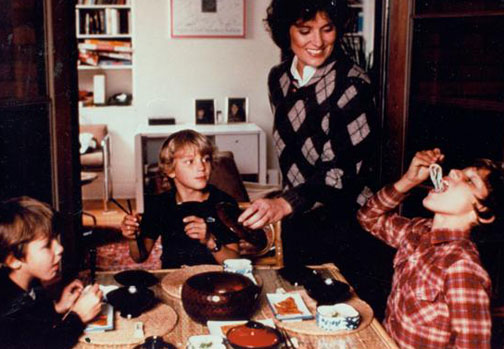
Justin Trudeau – on the right, in check shirt and pouring something presumably delicious down his throat, in a gesture reminiscent of his father – with beautiful mom from beautiful BC and brothers, way back in the day.
I especially liked  two pieces of punditry holding out hope for the forces of progress : “Election 2015: Best leader? Debater? Not Harper…BC residents choose Trudeau as top talker, Mulcair as prime minister in snapshot poll” (report on regional survey by Jeff Lee in the Vancouver Sun) ; and “Justin Trudeau ekes out win in leaders’ debate with no knockout punches, little high drama,” by Michael Den Tandt for Postmedia News.
5. SIGNS THAT THE BAD GUYS ARE DOING OK TOO – OR BETTER … ER WORSE! Another two headlines probably ought to be alarming for we progressive voters : “Joe Oliver leading in Eglinton-Lawrence: poll … Liberal challenger Marco Mendicino could find NDP support cutting his chances” ; and “Stephen Harper Cites Linda McQuaig Oilsands Comments To Criticize NDP.”
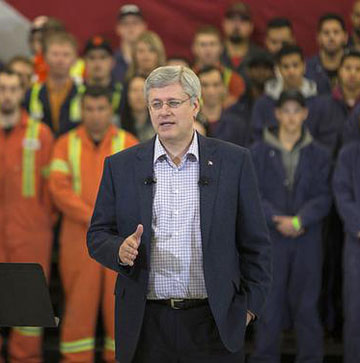
This may have something to do with the popular home reno tax credit Mr. Harper is promising to revive – after cancelling it in the first place.
Eglinton-Lawrence – the Toronto riding where renegade Tory Eve Adams lost the Liberal nomination – presents a hopefully not too classic example of how the schemes of Stephen Harper can profit from the divided progressive vote. And note Forum Research president Lorne Bozinoff on finance minister Joe Oliver’s current lead in the local polls : “If this is extrapolated across the country, the Conservatives may be in safer territory than we think.”
Meanwhile, Linda McQuaig’s recent hasty remarks on leaving the Alberta oilsands in the ground gave Mr. Harper a golden opportunity to hyperventilate on a favourite theme : “The NDP is consistently against the development of our resources and our economy. That is why they have been a disaster wherever they have been in government and why they would wreck this economy if they ever got in, and why they must never get into power in this country.” (As they have recently done in Mr. Harper’s own home province of oil-rich Alberta … )
As Althia Raj has reported : “The NDP was quick to distance itself from McQuaig’s comments … Malcolm Allen, the party’s natural resources and energy critic and its candidate for Niagara Centre, said in a statement that keeping the oilsands in the ground is ‘not the NDP’s position.’”
6. BIG PUZZLE IN ONTARIO ?? [UPDATED AUGUST 12, 13]. Stephen Harper, MP for Calgary Southwest, finally won a majority government in 2011 because his Conservatives finally won two-thirds of the seats in Ontario (which has 38% of the cross-Canada population, and 36% of the seats in the elected parliament at Ottawa). But can the Harper Conservatives repeat this performance in 2015?
For recent action here see : “Ontario premier steps up war of words in federal election campaign” ; and “The road to victory runs through Ontario … Â War of words between Wynne and Harper will make it tougher than ever for Conservatives to hold onto crucial Ontario ridings.”
On the other hand, again, see Joe Oliver in Eglinton-Lawrence above! And note that Eric Grenier’s August 13/11 CBC Poll Tracker regional breakdown for Ontario gives the Harper Conservatives 52 of the province’s current 121 seats in the elected federal parliament (compared with 38 for the Liberals and 31 for the NDP) .
This is 21 less than the 73 Ontario seats Mr. Harper’s party won in 2011 – when Canada’s most populous province only had a total of 106 seats. But 52 of 121 is still a lot of seats – and at least 43% if not two-thirds of the Ontario total.
Another current distinguishing feature of Ontario on these numbers is that in this region the Liberals are ahead of the New Democrats! (A quiet tribute to Premier Kathleen Wynne ??) But prospects for the future still seem volatile at best. According to a recent individual poll result from Ipsos Reid/Global News :Â “In Ontario, the Conservatives (33%) and Liberals (33%) are tied, with the NDP not far behind (29%).” According to an individual poll from Forum Research, released August 13 : “The three main parties are at parity in battleground Ontario (NDP – Â 33%, Conservatives and Liberals – 31% each).”
Just what the diverse 21st century people of Ontario will finally do may remain puzzling until the moment of truth in the polling booth on October 19.
7. BALLOT QUESTION IS DO WE REALLY WANT FOUR MORE YEARS OF STEPHEN HARPER ?? That at least is how it looks in the part of Southern Ontario where I live.
A recent report by Les Whittington at the Toronto Star reviewed the record from at least one kind of progressive angle : “Election 2015: A decade of change under Harper … How Harper’s self-appointed mission of change has touched the lives of every Canadian.”
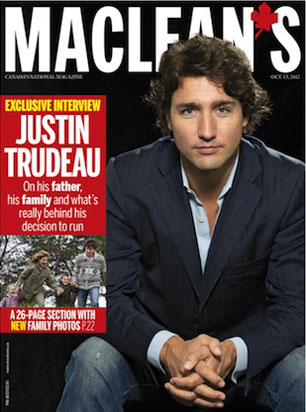
October 2012 – Can this Justin Trudeau at the edge of his first high tide suddenly reappear over the next 10 weeks?
In fact, of course, even a bare majority of Canadian federal voters have never wanted as much Stephen Harper as they have had already. The problem is that our current federal democracy does let you govern with less than 40% popular support … if the political arithmetic of our current electoral system more or less accidentally works to your advantage.
The ultimate guessing game in 2015 is what will happen to the political arithmetic this time – and that may be especially complicated!
8. IS A “COALITION” OF SOME SORT INEVITABLE ?? Althia Raj at Huffington Post Canada had an interesting column last Friday – “Maclean’s Leaders Debate: Why An NDP-Liberal Coalition Was Barely Mentioned.”
Ms Raj notes that the “2011 leaders’ debate was full of accusations and counter-accusations about the legitimacy of coalitions – Harper argued they were not, although they are perfectly legitimate …” Â But in 2015 “Thursday’s debate was surprisingly void of the type of boogeyman coalition talk that Harper had used … during the 2011 election.”
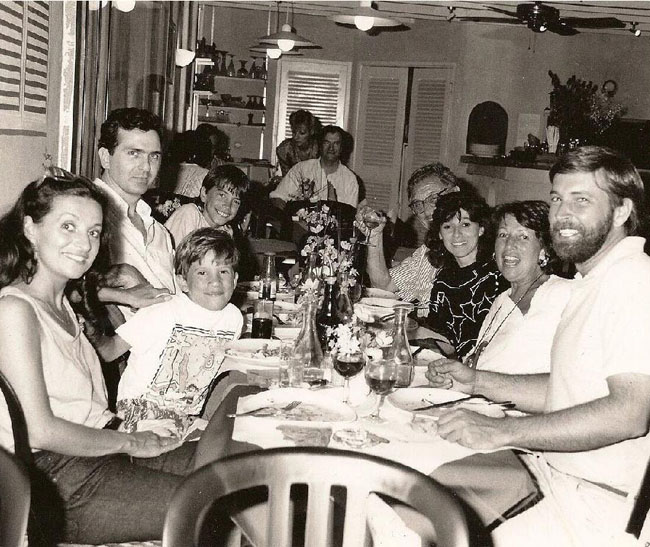
Thomas Mulcair family gathering in Nice on the fabled French Riviera in 1990. On the left: wife Catherine; son Greg; brother-in-law Jean-Luc Glock; son, Matt. On the right, next to Thomas : Catherine’s mother, Lydia; Catherine’s sister, Brigitte; and father Raphaël.
At the same time, one obvious cautionary tale is this past spring’s election in the United Kingdom. Polling beforehand in this case seemed to raise all manner of prospects for minority governments dependent on various strange and other bedfellow coalitions, or at least alliances. But in the end the Conservatives won a slender majority government, with a mere 36.9% of the popular vote! No doubt this is what Stephen Harper is banking on for October 19, 2015 in Canada too. And many Canadian voters are actually praying that this time around his scheming won’t work.
